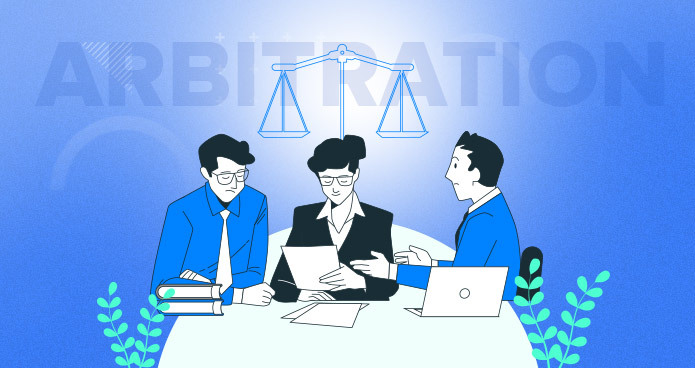Arbitration is an effective way to resolve disputes without going through the court system. An arbitrator, selected by you and your opponent, hears evidence from both parties in arbitration and makes a decision about how to settle the dispute. This decision is legally binding, so it's important that you understand what arbitration involves before deciding whether or not to agree to arbitration.
Benefits and Drawbacks of an Arbitration Process in a Dispute
- Quick and easy: The arbitration process is generally less expensive and less time-consuming than litigation, making it a popular choice for those seeking to resolve their disputes quickly and cost-effectively.
- Legally Binding: The arbitrator’s decision is based on the evidence presented by both parties and applicable law. It is usually final, meaning you can't appeal the arbitration decision in a court of law.
- Confidential: The arbitration process also offers more privacy than going through the court system, as arbitration proceedings are typically confidential and not made available to the public. Additionally, arbitration can provide an opportunity for dispute resolution that is tailored to meet your particular circumstances.
Examples of Situations for Arbitration
The arbitration process can be used in a variety of situations, including:
- Employment disputes
- Consumer transactions
- Business disputes
- Contractual disputes
- Partner and shareholder disputes
- Real estate disputes
How long does an Arbitration Process Take?
The arbitration process can take anywhere from a few days to several months depending on the complexity of the dispute. The arbitration process is typically faster than going through litigation in court, as arbitration does not require multiple hearings and rulings from a judge.
What Does an Arbitrator Do?
An arbitrator's job is to act as an impartial third party who listens to both sides and makes a decision based on the evidence presented. An arbitration hearing is similar to a trial in court, as each side will present their arguments and witnesses in support of their case.
The Difference Between Arbitration and Litigation
Arbitration is typically less formal and less expensive than going through the court system. The arbitration process is more private, as arbitration hearings are not open to the public and decisions are confidential. In arbitration, you can also decide on your own timeline for when arbitration will be completed, rather than waiting for a court date or other rulings from a judge.
There are some circumstances in which you have to resort to the litigation process. For example, if you are seeking injunctive relief (i.e., an order from a court of law that prohibits someone or something from taking a certain action).
Should You Agree to Arbitration?
Whether arbitration is right for you depends on the type of dispute and the parties involved. It can be a great way to resolve disputes quickly and cost-effectively, but it's important to make sure that arbitration is in your best interests before agreeing to arbitration. If you're unsure about arbitration, it may be beneficial to discuss the issue with an attorney or other professional.
If you decide arbitration is right for your dispute, make sure to hire an experienced arbitrator who understands your particular case. Working with a knowledgeable arbitrator can ensure that the arbitration process runs smoothly and that your legal rights are protected.
What is the Best Time to Resort to Arbitration?
ASAP. When the parties involved in a dispute agree to arbitration, it is usually best to start arbitration as soon as possible. This allows both sides to present their evidence quickly and address any issues that may arise during the arbitration. If arbitration is not started right away, it could lead to delays or additional costs and time spent on litigating the case.
Conclusion
Arbitration can be a great way to resolve disputes quickly and cost-effectively. But it's important to make sure arbitration is the right choice for your particular situation before proceeding with arbitration. If you do decide arbitration is the best option, make sure to hire an experienced arbitrator who understands your case and the arbitration process. This will help ensure that arbitration runs smoothly and your legal rights are protected.













